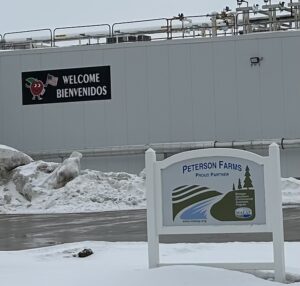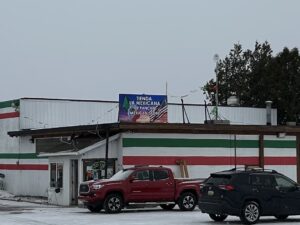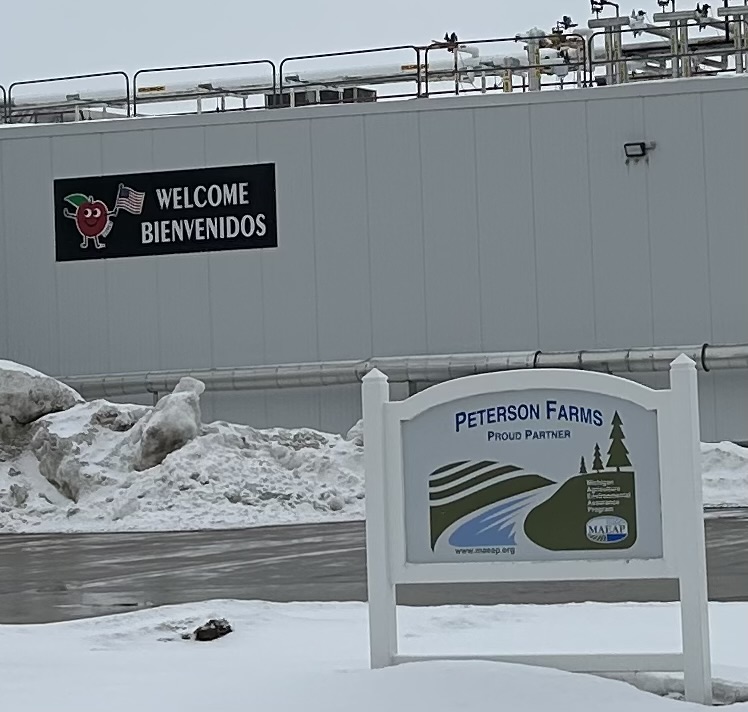President Trump’s Immigration and Trade Policies Surface Tension in Rural Middle America
OCEANA COUNTY, MICHIGAN – As the executive orders and social media posts fly out of the new Trump administration, the media have struggled to keep up with the flurry of proposed and actual changes. Washington seems more chaotic than usual.
But, ultimately, the success or failure of the new regime will hinge on how those moves impact local communities outside the Beltway around the country. This western Michigan county shows how complicated that story may be.
Sitting on Lake Michigan, Oceana County went heavily for President Trump in the 2024 election; he won it by 30 percentage points. It’s a Rural Middle America community in the American Communities Project, and a good example of that kind of place. It’s small-town America, with an economy driven by a mix of small businesses.
And agriculture is a crucial part of Oceana, with 110,000 acres of farmland and 10% of the population employed in the sector. The county has a large white and senior population, 81% white and non-Hispanic and 23% over the age of 65. It also has a large Hispanic population by Michigan standards, about 16% compared to 6% statewide.
Taken together, those numbers reveal a county that is exposed in different ways to big changes out of Washington in areas like immigration and trade policy — and even though the Trump administration is only a few weeks old, some effects are already being felt here.
The Calm of Winter
These are quiet days in Oceana. Many roads are covered in snow and ice, and rolling hills are covered with dormant, leafless trees planted in rows. The waterside towns are quiet and mostly empty with ice-fishing tents popped up on the frozen water.

On the edge of small-town Shelby, the massive Peterson Farms complex is still active around the juice plant, the applesauce plant, and the fresh plant, which features an anthropomorphic apple holding an American flag beside the words “Welcome” and “Bienvenidos.” The company provides apple slices to McDonald’s Happy Meals and is an economic anchor.
But sitting in Deb’s Café in Shelby, Juanita Estrada, a retired state social worker, says the streets have been quieter than usual lately. The Oceana Hispanic Center Facebook page offers clues about why.
“In the interest of keeping our community informed, please be aware that ICE presence has been confirmed in both Holland and Grand Rapids,” the page says, referring to two cities in the area. “Information on how to stay safe can be found on out blog.”
Estrada says fewer Hispanic residents are shopping in the stores and taking trips around town because of U.S. Immigration and Customs Enforcement’s presence. “Before, you know, people would just be out in their cars taking a cruise or whatever. You don't see that. People are scared. And the reason they're scared is because some of the parents have not yet gotten citizenship.”

A Tense Situation
Estrada first came to the county in the 1960s with her family for work in the farms. Her mother was a Texan, but her father was from Mexico, and there was good work up in Oceana, particularly picking asparagus, which is physically demanding and time-sensitive labor.
Scores of other families came to Oceana as well and, eventually, many migrant workers settled here. They had children and raised families. Over the years, a lot of parents started but never completed the process to become American citizens.
In this county of 26,000, Estrada estimates that there are still hundreds of residents who have not completed the citizenship process. They own homes and businesses, she says, and they are deeply concerned about what comes next. The local high school is more than 40% Hispanic. In nearby Hart, Michigan, the high school population is about 35% Hispanic.
The farms still need workers, of course, but those jobs are increasingly filled by workers from Mexico on H-2A visas. As of 2025, the workers receive $18.15 an hour in Michigan, plus housing and money for travel, and then head home (usually after a year, but stays can be extended up to three years). Those positions pay more than the old migrant laborers used to receive. Although there is no sign that the Trump administration will cut the number of H-2As, Estrada says there are still concerns in the community.
“It'll be interesting to see if, in fact, you know, they don't touch that program because it's much needed,” Estrada says. “And then the other thing also, which is really sad, you know, it saddens my heart, is the people that are here [long-term non-citizens who work in agriculture] that fear that they're going to be picked up. That’s the only livelihood they have.”
Life on the Farm
Sitting in his kitchen, Larry Van Sickle, who supported Trump in 2024, acknowledges there has been a lot of “saber rattling” coming from the White House, but he sees signs of the president working.
“I know here just last week when he threatened them tariffs, which is mainly a tactic of his, because he'll negotiate something. You gotta read between the lines when he put something out, because he's up to something, and not necessarily what he's saying,” Van Sickle says.
At 82, Van Sickle has seen how the community’s population has changed over time. He farms asparagus and raises cattle on his 500 acres of land in Oceana, where he has farmed for decades. Back in the ’80s, migrant workers would come up from Mexico and pick pickles on his farm, he says, and a lot of them ended up settling in the county. Their children got better jobs, and it became harder to get workers, which meant the community had to rely on the H-2A program.
“With that program we can get the workers, but the margins are tight,” Van Sickle says. “You used to be able to get the stuff picked for about 25% of the value, now you’re up to 50% or more.”
But he says many of the local packing houses are employing people from the county, who may or may not have citizenship or green cards. And deportations of such workers, many of whom have been in the community for decades, could hit those facilities.
Van Sickle has played many roles in the community, from serving on the school board to serving as county commissioner to serving on the board of the Hispanic Center of Western Michigan, and one thing he was surprised to learn is how large the undocumented population in the county still is.
“I think what’s happened is they’ve come here, they’ve got a job, and they don’t want to stir the pot, and for the most part they are good workers,” he says. The goal, he says, should be to get those people on a path to citizenship. “That would be a respectable thing to do.”
He is not especially worried about a big batch of deportations hitting his community. “A crackdown would have an impact, but I think with all the big cities, the Chicagos, the New Yorks, and the Denvers, and they're trying to hunt down the criminal type, I think they'd be wasting their time coming up here.”
The Problem of Uncertainty
Of course, nobody knows for certain what the Trump administration will do, and that’s true for areas beyond immigration. One of the president’s most consistent patterns is throwing out ideas as trial balloons and announcing changes out of the blue. Such an approach presents its own set of challenges, especially for anyone dealing with markets or contracts — like those in agriculture.
“All the markets, you’re dealing with speculators. If the price goes up, they can make money. It’s all about predictability,” Van Sickle says. “But in Trump’s mentality, he’s a negotiator.”
Van Sickle adds that Trump’s announced (and withdrawn) tariffs on Canada and Mexico showed the effects of this approach. He has cattle he’d like to sell in the fall, but is looking to sign a contract for a price now.
“The people that have cattle are not setting the price right. It's the speculators that are playing on the Chicago Board of Trade,” he says. “I haven't priced them yet, because the price wasn't good enough when we bought them, but the price was getting up close to where I could do something. Well, as soon as that tariff thing started, the stock market got itchy, and so cattle market took off 10 cents. Yeah, so now I'm waiting again.”
For Van Sickle, that’s OK. He knows Trump brings a unique leadership style to the White House and the “saber rattling” is part of the bargain. “If you're dealing with these foreign entities, they’re crooked bastards. And if you can't play in their ballpark, they're gonna get you. And well, he can play because he knows how to do that.”
Van Sickle’s concern is “people get excited about it,” and that can create problems, like the one he ran into with his cattle. He hears those concerns from his friends, especially those on the other side of the partisan divide.
Like most of Rural Middle America, Oceana County went heavily for Trump last November, and it is unlikely to ever abandon support for the president. But the culture and economy are complicated here. And even slight shifts in political attitudes can make a difference in a swing state like Michigan, where Trump won by about 80,000 votes out of more than 5.7 million cast. The ACP will return to this community this summer, when the crops and the tourists arrive, and check in with how its residents are feeling about the second Trump administration.


